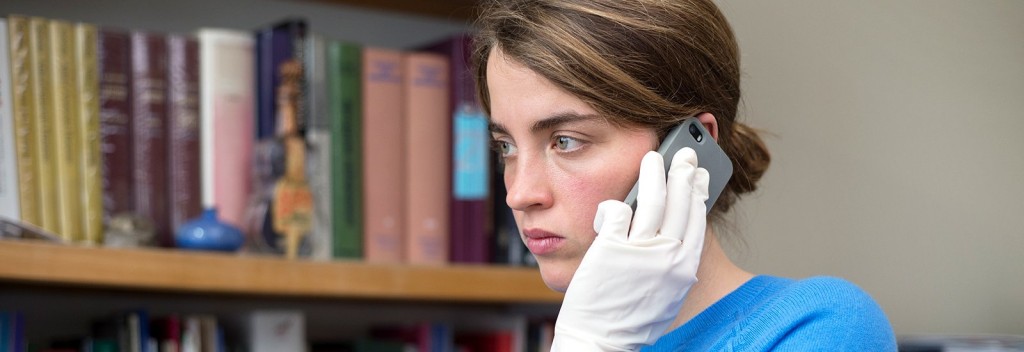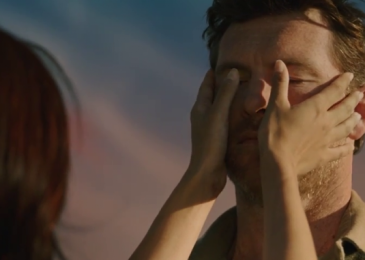The Red Turtle (dir. Michael Dudok de Wit; Netherlands/France/Japan)
— Oct 6 @ 6:15pm @ Vancouver Playhouse
Well this was a fine way to kick off my birthday. Produced by Studio Ghibli (the outfit behind Hayao Miyazaki’s films), The Red Turtle marks the feature debut of Dutch animator Michael Dudok de Wit, who won an Oscar for his short film Father and Daughter and was previously nominated for The Monk and the Fish — and in some ways this is really two short films put together. The first half is a brilliantly naturalistic depiction of a man stranded on a desert island and his persistent efforts to escape that island, leavened with gently surreal dream sequences in which, for example, instead of simply floating across the ocean, the man sees a bridge across the ocean and floats across that. But then something genuinely magical happens at the midway point, and the second half of the film becomes an ode to the “cycle of life”. I’m not sure that the magical plot twist works as well as it should, but I liked the film’s light humour (the crabs almost steal the show), and I definitely appreciated its matter-of-fact depiction of death and violence in the natural world, from the animals that are sometimes found washed up on the beach to the tsunami that hits the island with devastating force. See this film on a big screen if you can, for the sound design as well as the visuals.
–
Harold and Lillian: A Hollywood Love Story (dir. Daniel Raim; USA)
— Oct 13 @ 6pm @ VanCity Theatre
What a wonderful documentary. Harold Michelson was a storyboard artist in the ’50s who became an Oscar-nominated production designer in the ’70s, while his wife Lillian ran one of the most sought-after research libraries in Hollywood; between them, they worked on hundreds of classic movies — but a lot of their work went uncredited. This film seeks to correct that error somewhat, by pointing out that some of the artform’s most iconic images — from the parting of the Red Sea in The Ten Commandments to that famous shot of Dustin Hoffman framed by Anne Bancroft’s leg in The Graduate — were actually conceived by Harold at the storyboard stage (and not by the films’ directors or cinematographers), while also showing how Lillian figured out such things as what sort of undergarments the Jewish peasant girls ought to be wearing in Fiddler on the Roof. There are interviews here with Mel Brooks, Francis Ford Coppola, Danny De Vito and others, and lots of great anecdotes about David Lynch, Tom Waits, Alfred Hitchcock and so on (at one point Lillian recalls how she, a Trekkie, had to persuade Harold, who didn’t like science fiction, to join the production-design team on Star Trek: The Motion Picture — a gig that got him his first Oscar nomination), but the most pleasant surprise is the story of Harold and Lillian themselves, who lived through a lot of social changes and had to raise an autistic son when no one really knew how to deal with autism. For my money, this is the most emotionally affecting film I have seen at the fest so far this year.
–
The Unknown Girl (dir. Jean-Pierre and Luc Dardenne; Belgium/France)
— Oct 3 @ 9:15pm @ The Centre / Oct 14 @ 6:15pm @ SFU Goldcorp
Reportedly the latest film from the Dardenne brothers wasn’t as well-received as their earlier films (Rosetta, The Son, etc.) when it premiered at Cannes a few months ago; as a result, the film has been re-edited and is now seven minutes shorter. Even in its current form, it’s certainly not their best film, but it’s a fine exercise in empathetic humanism just the same. The story concerns a doctor who learns that a woman she turned away from her clinic late one night was found dead by the river mere hours later. The woman had no identification when she was found, and the doctor, stricken with guilt, makes a point of trying to figure out who the woman was, so that the woman’s family can claim the body. The way the doctor goes from one potential witness to the next is reminiscent of the Dardennes’ last film, Two Days, One Night, in which a female factory worker spoke to her co-workers one-by-one in a bid to keep her job; but the stakes seem less urgent this time, despite the occasional threats of violence from some of the male witnesses, and the plot tends to circle back to certain characters again and again instead of building to a more traditional climax. All that being said, I respect the film’s moral sensibility, and the way it suggests that our moral obligations to one another don’t come to an end simply because one of us dies.
— For more information or to purchase tickets, check out the VIFF website.






